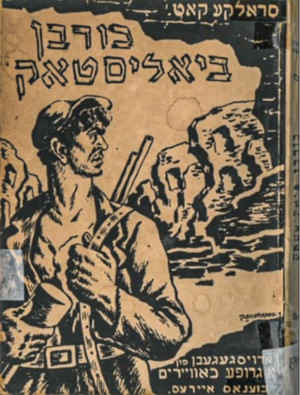 |
53°08' / 23°09'
Translation of
Khurbn Bialystok
Author: Srolke Kot
Buenos Aires, 1947
Project Coordinator
Translator
Our sincere appreciation to Susan Kingsley Pasquariella and Beate Schützmann-Krebs,
Beate's original project may be viewed here.
The original book may be viewed at the Yiddish Book Center.
Purchase details for a printed copy of this book can be found at http://www.jewishgen.org/yizkor/ybip/YBIP_Bialystok.html
We wish to thank Donni Magid for extracting the English translation,
enabling this online presentation.
This is a translation of: Khurbn Bialystok
JewishGen, Inc. makes no representations regarding the accuracy of
the translation. The reader may wish to refer to the original material
for verification.
JewishGen is not responsible for inaccuracies or omissions in the original work and cannot rewrite or edit the text to correct inaccuracies and/or omissions.
Our mission is to produce a translation of the original work and we cannot verify the accuracy of statements or alter facts cited.
|
|
| [Cover of the original book, courtesy of Dr. Tomek Wisniewski] |
|
|
By publishing the book “Khurbn Bialystok” the committee fulfills not only
a social obligation to the city of Bialystok, which heroically defended itself
against the enemy of the Jewish people and whose sons maintained courage
and fighting spirit under the most difficult conditions. Those sons were
characterized by such deep human solidarity with the fellow sufferer and
acted heroically in the unequal struggle in the ghetto when the ghetto was
surrounded.
Bialystok — this was not a name of a city in the usual sense of the word. Bialystok was a great cultural center, which not only provided the Jewish world with intelligence, but also, through the mass of its workers, held the finest traditions of the struggle for freedom and justice. Moreover, the martyred city of Bialystok, tormented and trampled by the German murderers, resisted in such conditions that we cannot even imagine, rose to the ghetto uprising and defended the soil of the Jewish people, unaffected by the fact that the struggle was doomed from the outset to certain death. The author of the book “Khurbn Bialystok”, Srolke Kot, who endured the hardships of the ghetto and later bore the struggle in the forest on his own shoulders, is himself a sufferer, a witness and accuser against the perpetrators of the cruel crime. It was not his intention to write a literary work, but to bring to light the naked truth about what happened; and that about which he could not write is felt by the reader, in the humble, simple words of the partisan “Kot”, a soldier of the Jewish people. With the publication of this book we provide another document to the history of our martyrdom, to the history of heroic Bialystok, whose courage and example serves as a light pillar for future generations.
Buenos Aires, April 1947, |
|
After the Second World War ended, Srolke Kot decided to live in Palestine. He settled in Haifa, taking a ship from the Italian port of Bari, a ship which he often thought was about to sink into the Mediterranean. While in Haifa, his sole surviving brother, Meyer Kot, who had left for Argentina before the war, managed to find him and they began corresponding. Srolke's letters to Meyer about his experiences during the Holocaust became the seeds of this book, and were published in the Yiddish newspaper in Buenos Aires. In 1947 Meyer succeeded in bringing Srolke to Argentina. He had to enter with a false passport via Paraguay as the government at the time did not allow him to migrate legally. Once in Argentina, Srolke settled into a new life with the help of his brother, always maintaining his links to his fellow countrymen from Bialystok and other survivors of the Holocaust. He met and married Helena Zimmerspitz, an Argentina-born daughter of a Poland-born father and Russia-born mother, with whom he had and raised two daughters. Helena passed away in 1983. Srolke (or Zeide, as he was called by his family) integrated into Argentinian society, applying himself to commerce. He and his wife had a grocery store and later he sold children's clothing. He participated in various community committees, such as for a banking cooperative. He continued writing throughout his life, including a column on current affairs and politics in his local newspaper which ran for many years. He dedicated a large part of his life to anti-fascism and the telling of his story and that of the suffering of the Jews in World War Two. This included giving numerous talks at events commemorating ghetto uprisings and the Holocaust more generally and volunteering his time at the Buenos Aires Shoah Museum. Despite his horrific experiences, Srolke lived with great joy and humour. Through his life and writing he taught all those who got to know him of the importance of the struggle against injustice and to never give up. For that we are truly grateful. Srolke passed away in 2007 at the age of 90. He is survived by two daughters, three grandchildren and six great-grandchildren. The eldest of his great-grandchildren honours his memory by having Srolke as his middle name. Provided by Srolke Kot's family |
 Yizkor Book Project
Yizkor Book Project
 JewishGen Home Page
JewishGen Home Page
 Bialystok, at Kehilalinks
Bialystok, at Kehilalinks
Copyright © 1999-2024 by JewishGen, Inc.
Updated 12 Dec 2023 by LA